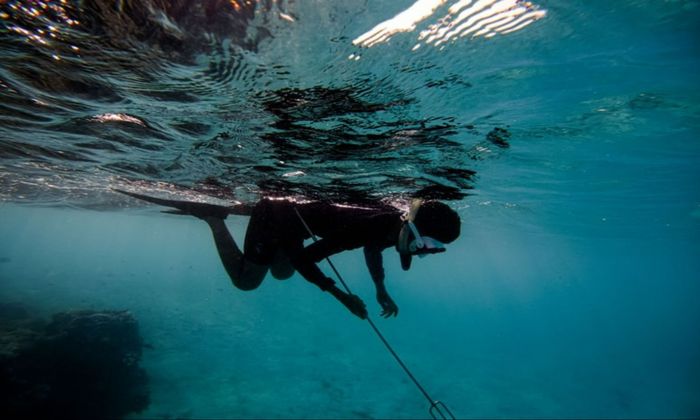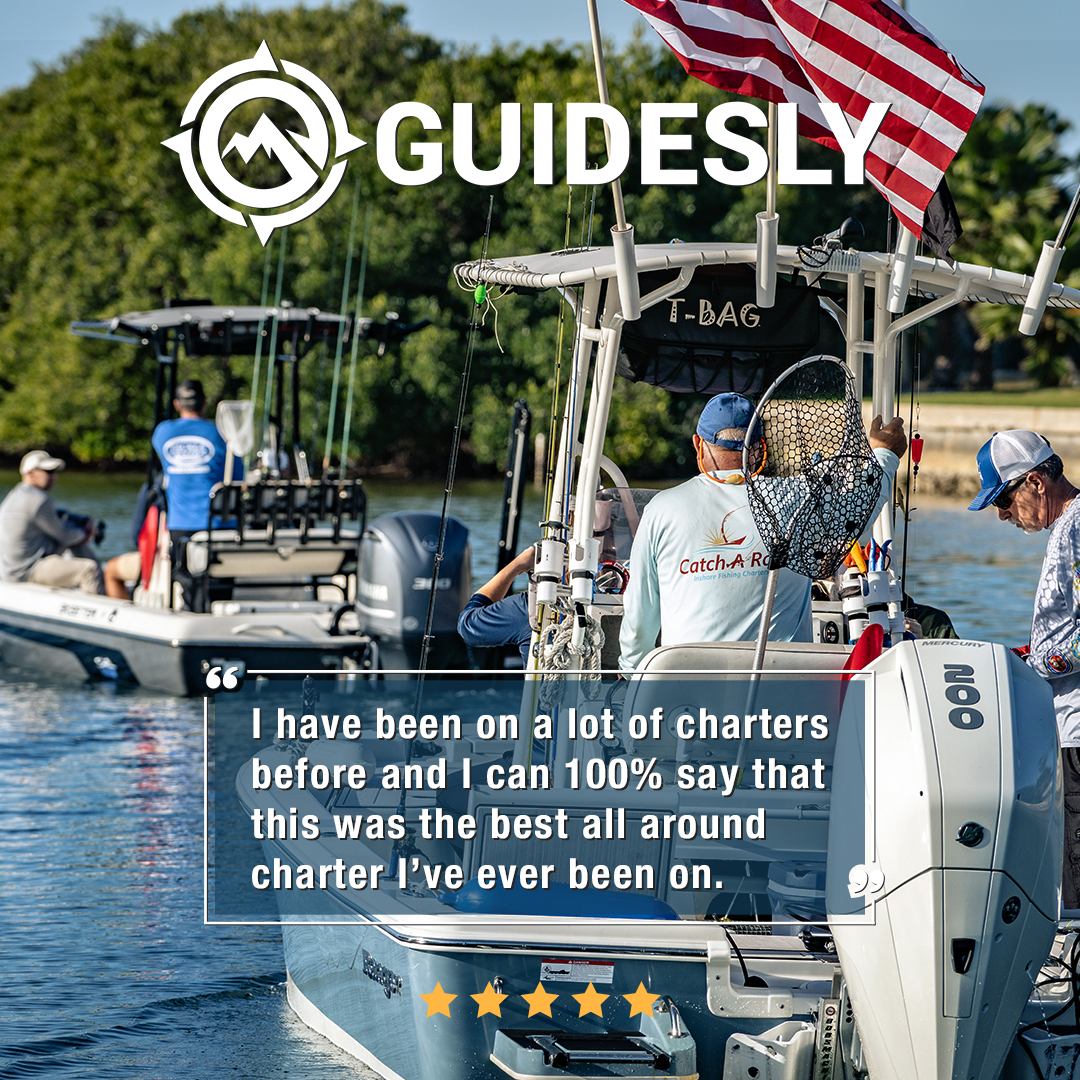Florida Spearfishing: What You Need to Know
Enjoy spearfishing in Florida with this quick guide on the sport's best spots and dos and don'ts.
Spearfishing is a fishing technique that lets anglers get in touch with their primitive sides. Nothing feels more primal and intimate than swimming alongside and catching your target fish with your own two hands underwater. And not only is it a good sport, but it’s also an excellent way to source your food sustainably.

But what is spearfishing? Spearfishing is catching fish with a spear-type instrument that you can manually or mechanically operate. This spear-type instrument is usually a single- or multi-pronged lance or spear that’s either barbed or barbless. The angler working the device is typically swimming or underwater while engaging in the sport.
Florida is one of the ideal places to spearfish in the United States. As a fishing capital, the Sunshine State boasts fantastic year-round weather and access to one of the world’s richest waterways in terms of habitat and fish species.

While Florida is much more open to spearfishing than other nations, it has its strict set of rules and regulations regarding the sport. So before bringing your spear to the state, read this quick Florida spearfishing guide and learn about the best spots in the area to spearfish, what you can or cannot catch, and what gear you can or cannot use.
Best Florida Spearfishing Spots
Spearfishing is only permitted in Florida's saltwater state waters. Freshwater spearfishing is strictly prohibited in the state, and spearfishing in saltwater bodies is also not free for all. Fishing with a spear 100 yards away from any public area is not permitted. These areas include swimming beaches, fishing piers (commercial and recreational piers alike), and any structure where public fishing is allowed. Spearfishing within 100 feet of a jetty above the sea surface is illegal, except if you’re spearfishing for the last 500 yards of a jetty that juts out more than 1,500 yards from the shores. Any water body under Environmental Protection and Recreation and Parks jurisdiction is also not open for spearfishing. There are other specific restrictions for harvesting per county, so make sure to familiarize yourself with those.
Florida Keys
The three keys in the Florida Keys region offer different spearfishing experiences. The Upper Keys is a great place to dive in medium waters for groupers and snappers in the reefs. The Middle Keys has plenty of artificial reefs in the form of shipwrecks where hogfish and snapper thrive. The Lower Keys are the most productive for spearfishing anglers. It’s where you go for game fish like tuna, wahoo, and common dolphinfish. For this reason, you either need to be an expert at spearfishing or book one of the spearfishing charters in Florida to get your fill.
Miami
Miami is one of the best places to fish in shipwrecks in Florida and worldwide. It is quite a busy and affluent tourist area, so you must go far out into the deep to enjoy some peaceful spearfishing.
Pensacola
Pensacola is a budget-friendly alternative to the Keys and Miami, but that does not take away from its richness as a spearfishing haven. It has an abundance of artificial reefs and plenty of stores where you can rent your gear for less.
What Anglers Can or Cannot Catch
Florida is known for its diversity of fish species, but not all are for the taking if you’re spearfishing. Here’s a list of the species that are illegal to catch with a spear: billfish (all species), spotted eagle ray, sturgeon, manta ray, shark, bonefish, tarpon, goliath grouper, nassau grouper, snook, blue crab, spotted seatrout, red drum, weakfish, stone crab, pompano, african pompano, permit, tripletail, lobster, and different types of ornamental reef fish and their family.

Here are some of the top spearfishing game fish in Florida:
Hogfish
If you’re spearfishing for the first time, your spearfishing guide in Florida will most likely take you to catch hogfish in the shallows. They’re easy to spot underwater because of their bright colors. What’s even better is that they make great table fare as well.
Grouper (except Nassau and Goliath Grouper) and Snapper
These fish species are plentiful in Florida — the smaller ones can be found in the shallows, while the bigger ones hide near the reefs. While they’re just around, they can be pretty hard to catch, so you’ll cut your teeth with these fish. They’re the best species to practice on and improve your spearfishing skills with.
Wahoo
If you’re ready to graduate to the big guns, try aiming for the wahoo. These fast fish are large and are quite the fighters. If you corner them, they might get aggressive. So you have to be an expert to get your hands and spear into this one.
Other fish species you can target when spearfishing in Florida:
Mahi Mahi or common dolphin fish, greater amberjack, lesser amberjack, cobia, black sea bass, flounder, sheepshead, lionfish, jack crevalle, and more. The same open and closed seasons for these saltwater fish will apply.
What To Bring on Florida Spearfishing Tours
A fishing license is one of the first things you must procure before going on fishing tours. To spearfish, you need a saltwater fishing license. You should also have a dive flag if you’re diving or snorkeling.
There are three types of spearfishing gear you can choose from, depending on your level. The pole spear or pole sling spear is perfect for beginners. A Hawaiian sling spear, often mistaken for a pole sling spear, is another beginner-friendly gear that works like a bow and arrow. If you’re ready to take your spearfishing to the next level, you should invest in a spear gun that allows you to spear faster.
Aside from your spearfishing device, you will also need snorkeling gear to help you perform better underwater: a mask, scuba or bodyboarding fins, and a weight belt.
Which spearfishing implements are you prohibited from using in Florida? Powerheads or bangsticks — long sticks with bullets at the end are illegal to use for harvesting any species except for personal protection. Rebreathers, devices that allow divers to “rebreathe” oxygen and stay underwater without the interference of bubbles, are also illegal, except for people collecting lionfish.
Expert Florida Spearfishing Guides
Whether you’re a visiting angler or new to spearfishing, booking a local guide or fishing charter is a must. Choose a charter that specializes in the technique and is conveniently located near your accommodation. If your target species cannot be legally caught with a spear, book a fishing charter specializing in techniques that can be used on them. Fish Bonz Charters targets redfish, snook, and tarpon – fish species that cannot be caught in spearfishing. Fish Maniac Bass Charters specializes in bass fishing in freshwater. There are fishing charters like Kings Fishing Charters and Twysted Lyfe Charters that offer both spearfishing and other techniques, though you will have to book separate trips if you want to enjoy a range of fishing styles.




